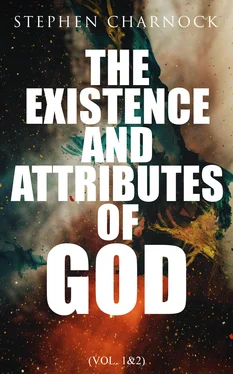Stephen Charnock - The Existence and Attributes of God (Vol. 1&2)
Здесь есть возможность читать онлайн «Stephen Charnock - The Existence and Attributes of God (Vol. 1&2)» — ознакомительный отрывок электронной книги совершенно бесплатно, а после прочтения отрывка купить полную версию. В некоторых случаях можно слушать аудио, скачать через торрент в формате fb2 и присутствует краткое содержание. Жанр: unrecognised, на английском языке. Описание произведения, (предисловие) а так же отзывы посетителей доступны на портале библиотеки ЛибКат.
- Название:The Existence and Attributes of God (Vol. 1&2)
- Автор:
- Жанр:
- Год:неизвестен
- ISBN:нет данных
- Рейтинг книги:3 / 5. Голосов: 1
-
Избранное:Добавить в избранное
- Отзывы:
-
Ваша оценка:
- 60
- 1
- 2
- 3
- 4
- 5
The Existence and Attributes of God (Vol. 1&2): краткое содержание, описание и аннотация
Предлагаем к чтению аннотацию, описание, краткое содержание или предисловие (зависит от того, что написал сам автор книги «The Existence and Attributes of God (Vol. 1&2)»). Если вы не нашли необходимую информацию о книге — напишите в комментариях, мы постараемся отыскать её.
The Existence and Attributes of God (Vol. 1&2) — читать онлайн ознакомительный отрывок
Ниже представлен текст книги, разбитый по страницам. Система сохранения места последней прочитанной страницы, позволяет с удобством читать онлайн бесплатно книгу «The Existence and Attributes of God (Vol. 1&2)», без необходимости каждый раз заново искать на чём Вы остановились. Поставьте закладку, и сможете в любой момент перейти на страницу, на которой закончили чтение.
Интервал:
Закладка:
3. Hence springs all presumption, the common disease of the world. All the wickedness in the world, which is nothing else but presuming upon God, rises from the ill interpretations of the goodness of God, breaking out upon them in the works of creation and providence. The corruption of man’s nature engendered by those notions of goodness a monstrous birth of vain imaginations; not of themselves primarily, but of God; whence arose all that folly and darkness in their minds and conversations (Rom. i. 20, 21). They glorified him not as God, but, according to themselves, imagined him good that themselves might be bad; fancied him so indulgent, as to neglect his own honor for their sensuality. How doth the unclean person represent him to his own thoughts, but as a goat; the murderer as a tiger; the sensual person as a swine; while they fancy a God indulgent to their crimes without their repentance! As the image on the seal is stamped upon the wax, so the thoughts of the heart are printed upon the actions. God’s patience is apprehended to be an approbation of their vices, and from the consideration of his forbearance, they fashion a god that they believe will smile upon their crimes. They imagine a god that plays with them; and though he threatens doth it only to scare, but means not as he speaks. A god they fancy like themselves, that would do as they would do, not be angry for what they count a light offence (Psalm l. 21): “Thou thoughtest I was such a one as thyself;” that God and they were exactly alike as two tallies. “Our wilful misapprehensions of God are the cause of our misbehavior in all his worship. Our slovenly and lazy services tell him to his face what slight thoughts and apprehensions we have of him.” 282Compare these two together. Superstition ariseth from terrifying misapprehensions of God: presumption from self‑pleasing thoughts. One represents him only rigorous, and the other careless. One makes us over‑officious in serving him by our own rules; and the other over‑bold in offending him according to our humors. The want of a true notion of God’s justice makes some men slight him; and the want of a true apprehension of his goodness makes others too servile in their approaches to him. One makes us careless of duties, and the other makes us look on them rather as physic than food; an unsupportable penance, than a desirable privilege. In this case hell is the principle of duty performed to heaven. The superstitious man believes God hath scarce mercy to pardon; the presumptuous man believes he hath no such perfection as justice to punish. The one makes him insignificant to what he desires, kindness and goodness; the other renders him insignificant to what he fears, his vindictive justice. What between the idolater, the superstitious, the presumptuous person, God should look like no God in the world. These unworthy imaginations of God are likewise,
2. A vilifying of him. Debasing the Creator to be a creature of their own fancies; putting their own stamp upon him; and fashioning him not according to that beautiful image he impressed upon them by creation; but the defaced image they inherit by their fall, and which is worse, the image of the devil which spread itself over them at their revolt and apostasy. Were it possible to see a picture of God, according to the fancies of men, it would be the most monstrous being, such a God that never was, nor ever can be. We honor God when we have worthy opinions of him suitable to his nature; when we conceive of him as a being of unbounded loveliness and perfection. We detract from him when we ascribe to him such qualities as would be a horrible disgrace to a wise and good man as injustice and impurity. Thus men debase God when they invert his order, and would create him according to their image, as he first created them according to his own; and think him not worthy to be a God, unless he fully answer the mould they would cast him into, and be what is unworthy of his nature. Men do not conceive of God as he would have them; but he must be what they would have him, one of their own shaping.
1. This is worse than idolatry. The grossest idolater commits not a crime so heinous, by changing his glory into the image of creeping things and senseless creatures, as the imagining God to be as one of our sinful selves, and likening him to those filthy images we erect in our fancies. One makes him an earthly God, like an earthly creature; the other fancies him an unjust and impure God, like a wicked creature. One sets up an image of him in the earth, which is his footstool; the other sets up an image of him in the heart, which ought to be his throne.
2. It is worse than absolute atheism, or a denial of God. “ Dignius credimus non esse, quodcunque non ita fuerit, ut esse deberet ,” 283was the opinion of Tertullian. It is more commendable to think him not to be, than to think him such a one as is inconsistent with his nature. Better to deny his existence, than deny his perfection. No wise man but would rather have his memory rot, than be accounted infamous, and would be more obliged to him that should deny that ever he had a being in the world, than to say he did indeed live, but he was a sot, a debauched person, and a man not to be trusted. When we apprehend God deceitful in his promises, unrighteous in his threatenings, unwilling to pardon upon repentance, or resolved to pardon notwithstanding impenitency: these are things either unworthy of the nature of God, or contrary to that revelation he hath given of himself. Better for a man never to have been born than be forever miserable; so better to be thought no God, than represented impotent or negligent, unjust or deceitful; which are more contrary to the nature of God than hell can be to the greatest criminal. In this sense perhaps the apostle affirms the Gentiles (Eph. ii. 12) to be such as are “without God in the world;” as being more atheists in adoring God under such notions as they commonly did, than if they had acknowledged no God at all.
3. This is evident by our natural desire to be distant from him, and unwillingness to have any acquaintance with him. Sin set us first at a distance from God; and every new act of gross sin estrangeth us more from him, and indisposeth us more for him: it makes us both afraid and ashamed to be near him. Sensual men were of this frame that Job discourseth of (ch. xxi. 7–9, 14, 15). Where grace reigns, the nearer to God the more vigorous the motion; the nearer anything approaches to us, that is the object of our desires, the more eagerly do we press forward to it: but our blood riseth at the approaches of anything to which we have an aversion. We have naturally a loathing of God’s coming to us or our return to him: we seek not after him as our happiness; and when he offers himself, we like it not, but put a disgrace upon him in choosing other things before him. God and we are naturally at as great a distance, as light and darkness, life and death, heaven and hell. The stronger impression of God anything hath, the more we fly from it. The glory of God in reflection upon Moses’ face scared the Israelites; they who had desired God to speak to them by Moses, when they saw a signal impression of God upon his countenance, were afraid to come near him, as they were before unwilling to come near to God. 284Not that the blessed God is in his own nature a frightful object; but our own guilt renders him so to us, and ourselves indisposed to converse with him; as the light of the sun is as irksome to a distempered eye, as it is in its own nature desirable to a sound one. The saints themselves have had so much frailty, that they have cried out, that they were undone, if they had any more than ordinary discoveries of God made unto them; as if they wished him more remote from them. Vileness cannot endure the splendor of majesty, nor guilt the glory of a judge.
We have naturally, 1. No desire of remembrance of him, 2. Or converse with him, 3. Or thorough return to him, 4. Or close imitation of him: as if there were not any such being as God in the world; or as if we wished there were none at all; so feeble and spiritless are our thoughts of the being of a God.
Читать дальшеИнтервал:
Закладка:
Похожие книги на «The Existence and Attributes of God (Vol. 1&2)»
Представляем Вашему вниманию похожие книги на «The Existence and Attributes of God (Vol. 1&2)» списком для выбора. Мы отобрали схожую по названию и смыслу литературу в надежде предоставить читателям больше вариантов отыскать новые, интересные, ещё непрочитанные произведения.
Обсуждение, отзывы о книге «The Existence and Attributes of God (Vol. 1&2)» и просто собственные мнения читателей. Оставьте ваши комментарии, напишите, что Вы думаете о произведении, его смысле или главных героях. Укажите что конкретно понравилось, а что нет, и почему Вы так считаете.












